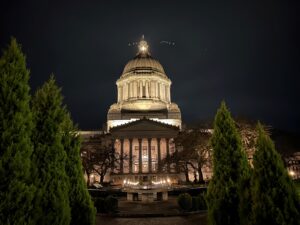
Notes From Olympia: Feb. 9, Week 5 of the 2024 Legislative Session
This edition includes highlights from legislative week 5, active bills, details on policy committee meetings, trivia on Black History and much more.
 A calm evening at the Capitol (on the outside, at least!)
A calm evening at the Capitol (on the outside, at least!)
(Photo Credit: Erica Hallock)
Trivia
How many Black legislators have served, and are currently serving, in the Washington State Legislature?
Highlights of Week
We’ve passed another cutoff! After a marathon four days of public hearings and executive sessions, the Legislature hit the House of Origin fiscal committee cutoff this past Monday. Bills that did not pass out of fiscal committees are considered “dormant” and not eligible for further consideration, unless deemed “Necessary to Implement the Budget” by legislative leadership.
For advocates, it was a rollercoaster weekend as email inboxes pinged with updates of bills getting scheduled (exhilaration) and, sometimes, bills removed from calendars (despair). In a small number of cases, bills were scheduled for a vote in time for the Monday deadline only to have the Chair announce at the hearing that they were withdrawn from consideration (the depths of heartbreak).
As one example of the volume of work, the Senate Ways and Means Committee agenda had 82 bills on its executive session calendar this past Monday and the House Appropriations Committee had 52.
Attention turns to Floor action. There is little to no downtime in a short session of a part-time Legislature. Starting Tuesday morning, attention shifted to the Senate and House chambers where lawmakers began the process of debating and voting on bills in advance of the Feb. 13 House of Origin cutoff.
I have mentioned the “filter” process built into our legislative system and a very important step in this process happens prior to Floor debate and consideration. The Senate and House Rules Committees consider the bills passed by the policy and fiscal committees and decide which bills advance to their respective Floors. Unlike other committees, these meetings are not scheduled at regular times. One Rules Committee notice this week stated that the meeting would commence “20 minutes after going at ease for lunch.” Prior to the pandemic, these Rules committee meetings were not covered by TVW, but now they are available.
To get to the Floor for debate and vote, a bill must first be “pulled” from the Rules Committee. There are various ways this occurs, and the Senate and the House have variations in their processes. In most Rules Committee meetings, there are “leadership” or “package” pulls where a list of bills is presented for consideration for an up or down vote. There are also “consent” pulls where bills with minimal opposition are listed together and voted on at once. Finally, there are “individual” pulls where each Rules Committee member is assigned a certain number of “pulls” per meeting (e.g., each Rules Committee member is allowed to suggest one bill to advance to the Floor and the Rules members vote to approve that recommendation). Despite the various opportunities for bills to be “pulled” from Rules, not all bills will advance from Rules to the Floor and advocates get more nervous as the week goes on and their bills remain in Rules.
 Here’s to hoping for only affirming and positive messages during the stressful period of Floor activity.
Here’s to hoping for only affirming and positive messages during the stressful period of Floor activity.
(Photo Credit: Molly Champion, image modified by Jess Galvez)
Stayin Alive, Stayin Alive …
The list of active early learning related legislation is much smaller at this stage in the process—post the initial policy and fiscal cutoffs. Be sure to check out our bill tracker on our policy resources page for more detail, but below is a quick look at the bills still moving their way through:
House Bills
- SHB 1945 (Alvarado) Makes children eligible for ECEAP and Early ECEAP if they receive Basic Food benefits and simplifies income eligibility for Working Connections Child Care (WCCC)
- HB 2111 (Nance) Makes technical changes to the WCCC statute
- SHB 2124 (Eslick) Changes WCCC work requirements to allow for family participation in Early ECEAP or Early Head Start and allows WCCC eligibility for ECEAP/Early ECEAP employees if their household income is below 85% of the state median income
- SHB 2195 (Callan) Modifies eligible uses of the Ruth LeCocq Kagi early learning facilities development account (ELF)
- SHB 2322 (Senn) Directs the Office of Financial Management to study existing employer-provided child care programs and provide recommendations for how to expand child care options through businesses
- 2SHB 2447 (Senn) Changes the removal standard for children regarding out-of-home placement due to the use or possession of a high potency synthetic opioid and provides targeted, voluntary home visiting and child care slots and other supports for families
Senate Bills
- SSB 5774 (Billig) Requires the Department of Children, Youth and Families to have the ability to conduct timely fingerprint background checks in its early learning and child care offices
- SB 5941 (Wilson, C.) Makes technical changes to the WCCC statutes
- SSB 6038 (Wilson, C.) Waives child care licensing fees and expands the child care business and occupations tax child care exemption
- 2SSB 6109 (Wilson, C.) Changes the removal standard for children regarding out-of-home placement due to the use or possession of a high potency synthetic opioid and provides targeted, voluntary home visiting and child care slots and other supports for families
What’s on Deck for Next Week?
It’s all about the money, money, money. On Valentine’s Day, the new State Economist Dave Reich is set to present his first Revenue Forecast to the Economic and Revenue Forecast Council. This revenue projection will be used to finalize the 2024-25 Supplemental Budget. It is important to remember that Washington state requires a balanced four-year budget, so budget writers will also be considering out-year impacts of their investments and out-year revenue outlooks.
We expect to see the Senate and House operating, capital and transportation (remember our state adopts THREE budgets) shortly after the revenue report. In fact, the Senate Ways and Means Committee has a Feb. 15 public hearing scheduled to receive comments on its proposed Supplemental Capital Budget, so we can presume their proposed Capital budget will be released sometime that day.
The last few weeks of the legislative session move very fast.
Late nights and weekend work ahead. While most Washingtonians will be preparing their favorite appetizers for Sunday’s Usher concert and viewing of expensive commercials, those involved with the legislative process could be engaged in Sunday Floor activity in advance of the Tuesday, Feb. 13 House of Origin cutoff (the House of Representatives does have a 1 p.m. hold for possible caucus and session). Most likely, though, after a lot of late nights, there may be a break on Sunday so folks can find out if a certain someone was able to arrive from Japan in time for the big game.
In all seriousness, the periods of Floor activity are incredibly intense, with a lot of late nights. Sometimes when I am on my early morning walks, the lights in the Legislative Building are still on, indicating one chamber has pulled an all-nighter and is still deliberating. Tempers get short and bills that had been on a smooth glide could get held up for no apparent reason.
One of the traditions during floor cutoff is identification of the “5 p.m. bill.” Often the 5 p.m. bill is a controversial or consequential bill because if debate starts before the 5 p.m. deadline, it can go on as long as it takes. Occasionally, the final bill can be a “nothing burger,” but more often than not, it is one of greater consequence and there will be murmuring about what the 5 p.m. bill will be in both chambers. We will report back next week.
Groundhog Day? Immediately after the Feb. 13 House of Origin cutoff, we will dive right back into policy committee work. This time, policy committees in the opposite chamber will review the bills still alive in the process passed by the opposing chamber. This is a very compressed timeline with only six days of policy committee hearings and a Feb. 21 opposite house policy committee cutoff. I mentioned last week one of the benefits of introducing companion bills is socializing a concept in the opposite chamber. This benefit becomes clear in these tight time periods.
Bill Tracker
Our bill tracker is updated each Thursday and linked on our policy resources page. Because bills move quickly, the tracker may not have the most recent updates, but this information can be found on the legislative website.
Trivia Answer
To date, Washington voters have elected a total of 29 Black legislators, including 11 Black legislators serving today:
- Senate: Senators John Lovick and T’wina Nobles
- House: Representatives April Berg, Brandy Donaghy, Debra Entenman, David Hackney, Melanie Morgan, Julia Reed, Kristine Reeves, Chipalo Street and Jamila Taylor
Last year, the Washington State Legislative Black Caucus filmed this message in honor of Black History Month.
Washington’s first Black legislator was William Owen Bush of Thurston County, elected to the first State Legislature in 1889. He was also the first of four Black Republicans who served in the Legislature. One of the bills he sponsored—HB 90—laid the foundation for a college emphasizing the study of agriculture that would later become Washington State University. To learn more about Representative Bush and his father George Bush, the first Black pioneer in the Washington Territory, visit our trivia in this throwback edition of Notes From Olympia.
While each of the 29 Black legislators who served in the Washington state Legislature has unique stories, for this week’s trivia, we wanted to focus on the first Black woman elected to the State Senate, Senator Rosa Franklin.
 Senator Rosa Franklin, 2009
Senator Rosa Franklin, 2009
(Photo Credit: Washington State Legislature)
Born in 1927 to a “homemaker mother and a corn farmer father” in rural South Carolina, Senator Franklin was the fifth of 11 children. Franklin attended Good Samaritan Waverly Nursing School in Columbia, South Carolina, a school built “by African Americans, for African Americans, to meet the healthcare needs of the community.” Following graduation, Senator Franklin began what would become a 42-year career in nursing.
During her time in nursing school, Senator Franklin and her friends would go to the United States Organization (USO) club to sing and dance when they were not in school or studying. There she met James Franklin who would become her husband for 70 years until his death in 2021. She considered her 70-year marriage one of her greatest achievements!
The Franklins moved to Tacoma in 1954 when her husband was stationed at Fort Lewis. During this time, Senator Franklin pursued her bachelor’s degree at what would become the University of Puget Sound. She had intended to obtain a degree in nursing, but she found the coursework duplicative of what she had already taken at Good Samaritan in South Carolina. She ended up earning a double major in English and Biology.
Senator Franklin ultimately spent more than 40 years in health care, focusing on women’s health and the health needs of the Black community. She also worked with disabled children and seniors in addition to extensive community involvement, which led her to politics.
She began her foray into politics with runs for the Tacoma City Council in 1973 and 1987, both of which were unsuccessful. In 1990, the Chair of the Pierce County Democratic Party convinced Franklin to run for the House of Representatives, and, using her rec room as the campaign headquarters, she leveraged her community relationships and connections to prevail over the person viewed as the natural successor to the seat. Realizing she could not continue her nursing career and serve in the Legislature, Franklin retired from nursing (with many, many well-deserved accolades).
After serving one term in the House, Franklin was appointed to the State Senate after the unexpected death of Senator A. L. “Slim” Rasmussen. Franklin was the top choice to fill the seat, but she only agreed to serve if she could sit on the Senate Health Care Committee – her top legislative priority.
During her time in the Senate, Senator Franklin is credited with sponsoring the Washington Housing Policy Act in 1993 which established the Affordable Housing Advisory Board. One has to assume Senator Franklin recognized the important connection between housing and health. She is also credited with groundbreaking policy work to address the intersections of health, race and environmental issues.
Her fellow Senators selected her to serve as the Senate Pro Tempore which meant she presided over the Senate when the Lieutenant Governor was absent for whatever reason. Notably, Senator Franklin was the first African American woman in the United States to serve in this position in her state Senate. Senator Franklin was known by her peers in the Senate as “the second fastest gavel.” Clearly a woman of efficiency!
Senator Franklin retired from the Legislature in 2010 and, in her retirement message, she wrote she planned to “… continue working to make our communities, state and nation live up to the principles on which they were founded, and that the constitution represents all of us and not just a select few.”
Resources:
Bush, William Owen (1832-1907) [HistoryLink.org]
Black Legislators of Washington State: Firsts & Statistics [Washington State Library]
Franklin, Rosa Gourdine (b. 1927) [HistoryLink.org]
New Data Indicates That Washington’s Legislature Became More Representative [South Seattle Emerald]
State Legislator Demographics [National Conference of State Legislators – 2020]
The State of Black Representation in the US Today [Public Wise]
About the Author

Erica Hallock
Director, Policy & Advocacy, Start Early Washington
Erica Hallock serves as the Director of Policy and Advocacy for Start Early Washington. She has worked in early childhood, health and human services policy in both California and Washington state.
More About Erica